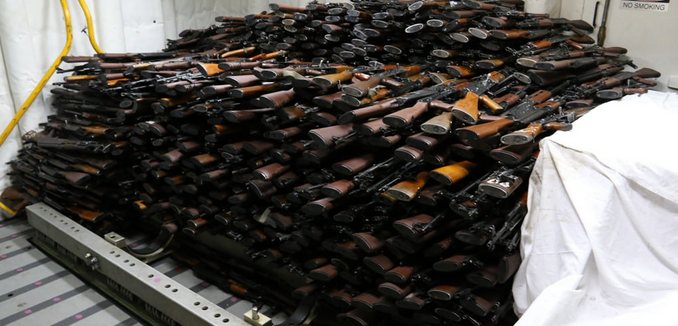American and coalition forces have intercepted five Iranian arms shipments to Houthi rebels in Yemen since April 2015, the commander of the United States Fifth Fleet announced last week.
Vice Admiral Kevin Donegan said that the weaponry included thousands of AK-47 automatic rifles, anti-tank missiles, and sniper rifles, CNN reported on Saturday.
The U.S. Navy determined that the shipments originated in Iran based on GPS data retrieved from the ships and information gleaned from questioning their crews. The crews were largely comprised of unemployed fishermen who were hired for a single shipment, Donegan added.
“One of the shipments had been validated by the United Nations as being an illegal weapons shipment,” Agence France-Presse reported, citing Donegan.
Iranian Foreign Ministry Spokesman Bahram Qassemi dismissed Donegan’s charges as “false claims.” However, in October, a senior Iranian diplomat told Reuters that there was a “sharp surge in Iran’s help to the Houthis in Yemen,” which Reuters explained was in reference “to weapons, training and money.”
“The nuclear deal gave Iran an upper hand in its rivalry with Saudi Arabia, but it needs to be preserved,” the diplomat added.
Three of the Iranian arms shipments were intercepted during March and April of this year en route to the Houthis, who are fighting against the Saudi-backed, United Nations recognized government of Yemen. The movement’s flag reads, “God Is Great, Death to America, Death to Israel, Curse on the Jews, Victory to Islam,” which is similar to Iran’s own revolutionary motto.
Two weeks ago, Gen. Joseph Votel, the top American military commander in the Middle East, accused Iran of having a role in several recent attacks on U.S. ships by the Houthis.
A United Arab Emirates ship was severely damaged by rockets earlier this month while transiting the Bab-el-Mandeb Strait, through which much of the world’s oil is shipped. Over the course of the next week, the U.S. Navy destroyer USS Mason, which was deployed to the area following the attack on the UAE vessel, was fired upon at least twice while patrolling the strait. The Mason later destroyed three radar sites in Houthi-held territory.
Yousef al-Otaiba, the United Arab Emirates’ ambassador to the U.S., charged in The Wall Street Journal in April that Iran was undermining chances of peace in Yemen by continuing to arm the Houthis.
Iran acknowledged its support of the Houthis after the rebels blocked the formation of a national government in October 2014. Shortly afterwards, an Iranian official said that with the capture of much of Sana’a, the Islamic Republic had control of its fourth Arab capital.
[Photo: Official U.S. Navy Page / Flickr ]




